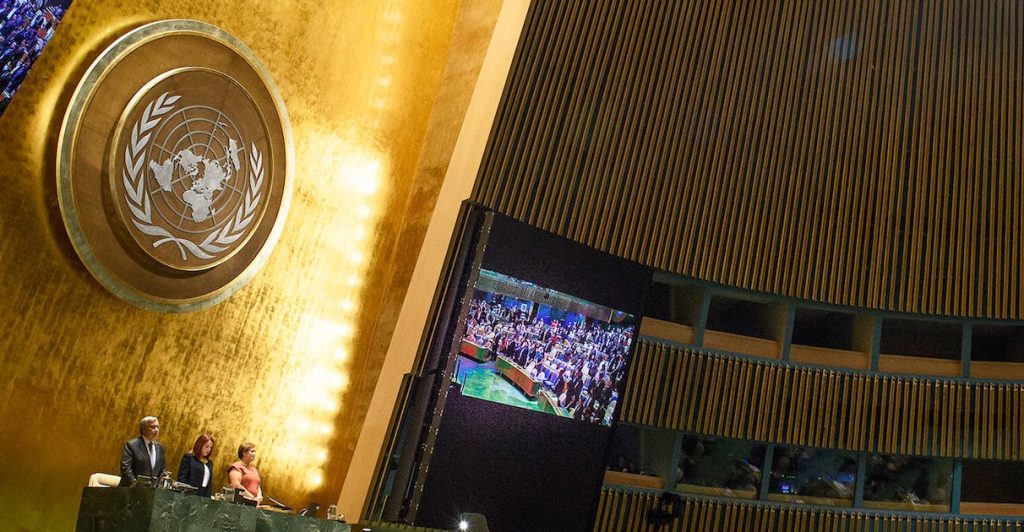World leaders are gathering in New York for the high-level week of the 73rd UN General Assembly (UNGA) — an annual moment for countries and sectors to come together and address the most urgent global issues. From tackling tuberculosis to increasing ambition on the Sustainable Development Goals to strengthening peacekeeping, there are several issues high on the agenda at this year’s General Assembly.
After years of decline, global hunger is on the rise, largely as a result of climate change and prolonged conflict in places like Syria, Yemen, and South Sudan. Forced displacement has reached a record high, plunging millions of families into poverty and peril. Meanwhile, climate change is disproportionately affecting vulnerable communities. At a time of growing instability and division, the UN offers a shared, neutral, and inclusive space to address these challenges and chart a better path forward.
In 2015, all 193 UN member states unanimously agreed on a roadmap to get there: The Sustainable Development Goals (SDGs). While there is progress, for example, in reducing under-five mortality, we’re not moving fast enough to achieve a world where no one is left behind by the year 2030. At this year’s General Assembly, leaders, experts, and activists alike will be calling for more innovation and ambition to accelerate momentum toward the global goals. In particular, there are seven issues we will be watching.
Follow the UN Foundation on Twitter, Facebook, and Instagram for live updates from the UN General Assembly.
Here’s what we’re watching and why:
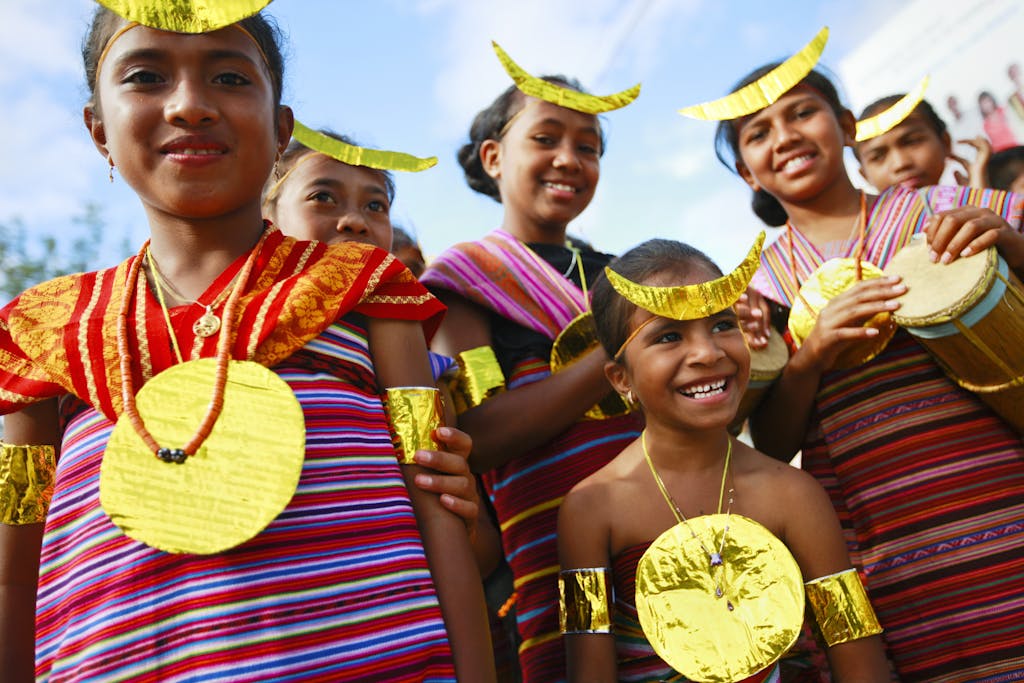
-
Empowering Young People
For the first time in its history, the UN will officially launch a system-wide strategy to step up its work with and for young people across three main pillars – peace and security, human rights, and sustainable development. The new strategy will provide a more coordinated, coherent, and holistic approach for the UN’s work on youth issues, at a time when the Secretary-General is advancing a series of reforms aimed at strengthening the effectiveness of the UN.
Why It Matters: There are currently 1.8 billion young people between the ages of 10 and 24 in the world, 90% of whom live in less developed countries. This is the largest youth population ever. Political instability, unemployment, and limited space for political and civic participation can isolate youth. Young people can be the architects of a better future if we do better at bringing them to the table. To achieve the global development agenda, we need the passion, participation and innovation of today’s youth.
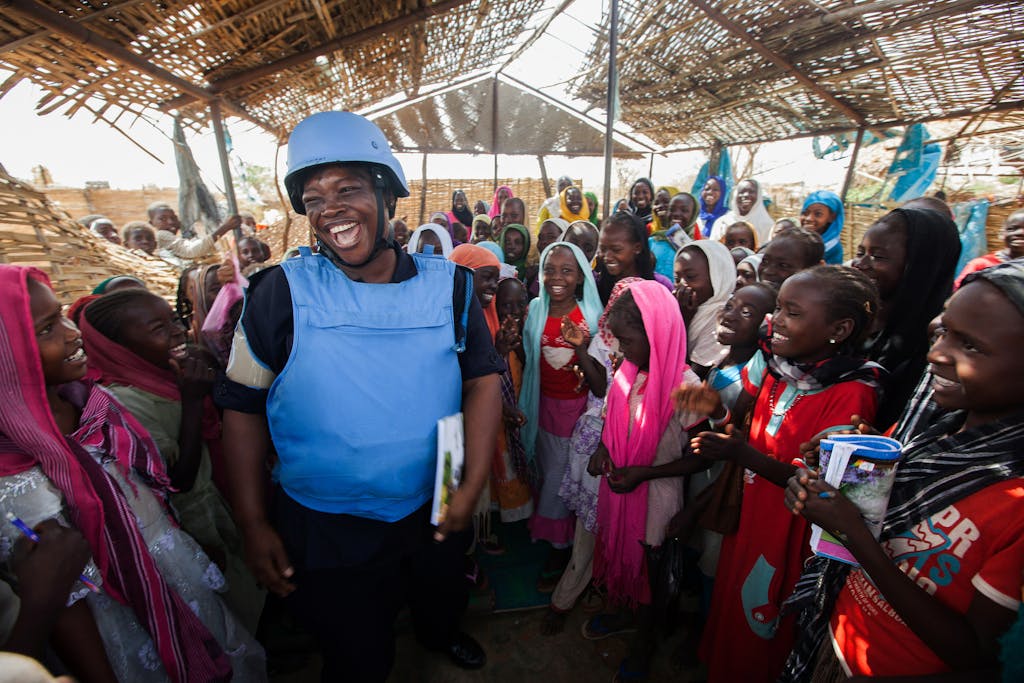
-
Advancing Peace
Right now, the UN is working to bring peace and stability to communities in 14 peacekeeping operations across the globe, including Mali and the Central African Republic. Peace and conflict prevention are the core of Secretary-General Guterres’ agenda, and he is spearheading Action for Peace, an initiative to mobilize greater support for political solutions to conflict as well as greater resources for well-structured, well-equipped and well-trained forces. Throughout UNGA, peace and security will be on the agenda, including an event on the Secretary-General’s Action for Peacekeeping Agenda, the Nelson Mandela Peace Summit, and other crisis-specific events.
Why It Matters: Conflict reverses development and carries a tremendous cost — both in human lives and physical destruction. Our peace and development agendas are connected, and we need progress on both to achieve lasting change for everyone, everywhere.
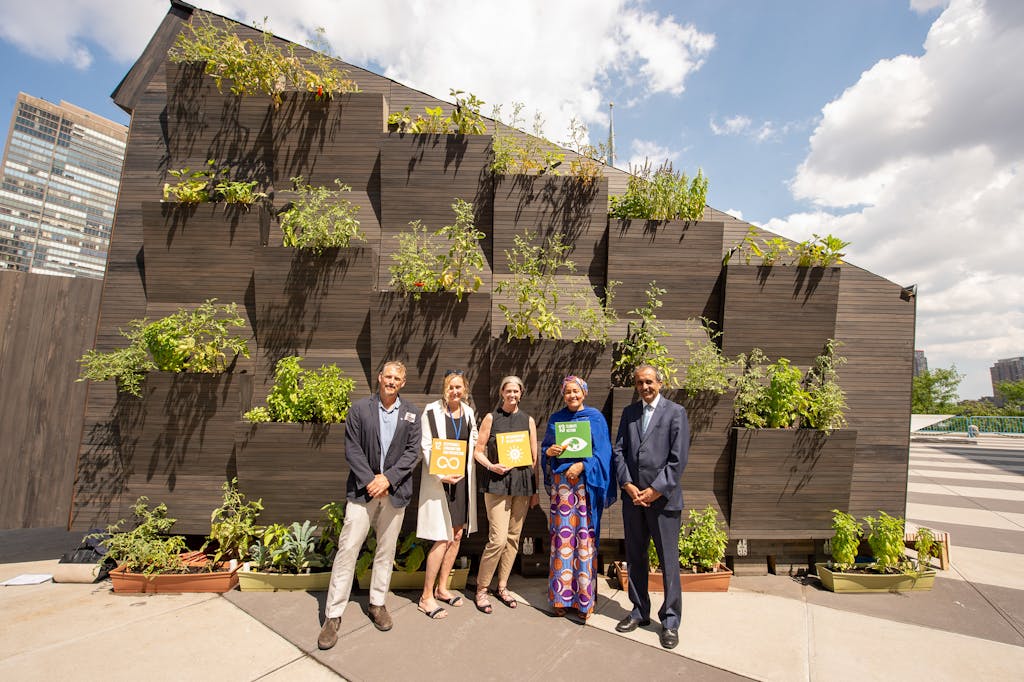
-
Accelerating Climate Action
The UN Secretary-General calls the planet’s continued use of fossil fuels “a suicidal path of emissions” in the face of scientific proof that climate change is real. The consequences can already be seen in countries like Australia and Malawi, which are experiencing record droughts, and felt by families in India, Laos, and Japan, which saw record flooding this year. “Climate change is the defining issue of our time,” the Secretary-General declared this month. “And we are at a defining moment.”
The UN is mobilizing global climate action through efforts like the landmark 2015 Paris Agreement and the Climate Summit that will be hosted by the Secretary-General in 2019. In the run-up to next year’s summit, France’s President Emmanuel Macron, former New York City Mayor and UN Special Envoy on Cities and Climate Michael Bloomberg, and the Jim Yong Kim, President of the World Bank, will co-host the second-annual One Planet Summit during UNGA to spur greater collaboration to protect the environment. This event continues the momentum of last week’s Global Climate Action Summit in San Francisco, which saw billions of dollars in commitments from local, state, federal and world leaders, as well as the private sector.
Why It Matters: Extreme and erratic weather — prolonged droughts, super-typhoons, flooding and wildfires — are already threatening our shared progress. The World Bank estimates that 100 million people could be pushed into poverty in the next decade as a result of climate change alone. Yet taking action on climate change will grow our economies and protect the planet. Now is the time to step up action.
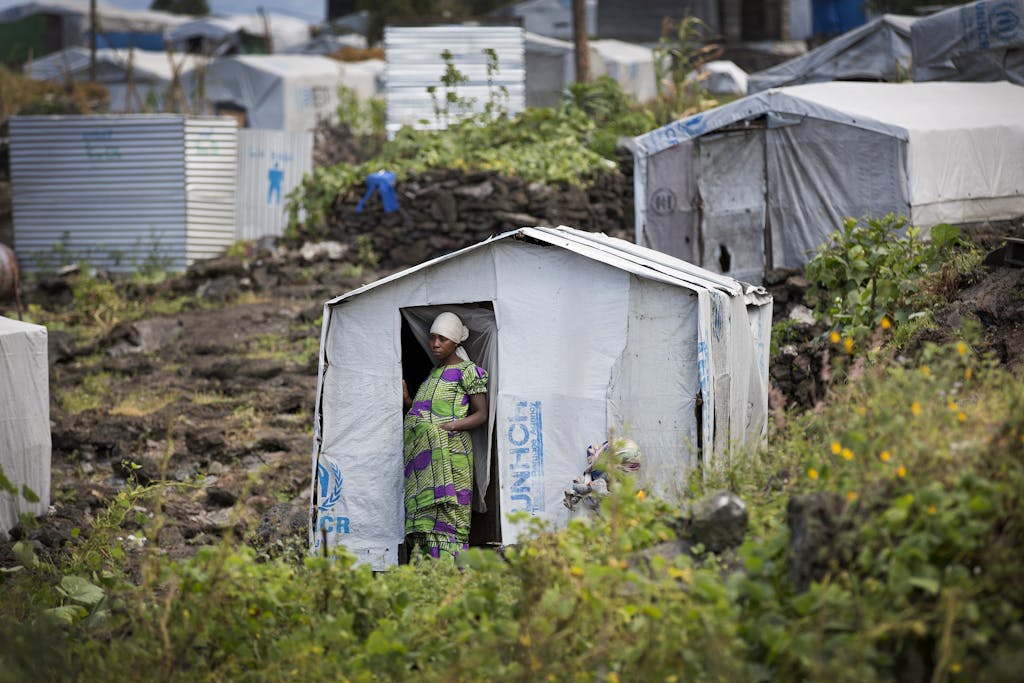
-
Protecting Refugees and Migrants
At the 2016 General Assembly, UN Member States unanimously adopted the New York Declaration for Refugees and Migrants, aimed at saving lives, protecting human rights, and sharing the global responsibility for refugees and migrants. Out of this process comes two new compacts, which will be discussed at UNGA.
This summer, the Assembly agreed on the text of the Global Compact for Migration, the first-ever UN agreement to promote safe, orderly, and regular migration. It comprises 23 objectives for better managing migration at local, national, regional, and global levels and will be formally adopted by the Assembly later this year in Marrakech.Additionally, the UN Refugee Agency (UNHCR) will present the Global Compact for Refugees for consideration this fall. Its four key objectives are to: 1) Ease the pressures on host countries; 2) Enhance refugee self-reliance; 3) Expand access to third-country solutions; 4) Support conditions in countries of origin for return in safety and dignity.
Why It Matters: To achieve the promise of the SDGs to leave no one behind, we must reach refugees and migrants. As a result of conflict and climate change, the world is experiencing the highest levels of displacement in human history. Displaced families are vulnerable to violence, hunger, and disease and often lack access to vital services, such as health care, energy, and water.
Unlike forced displacement, migration can be a positive global phenomenon. Migration is an engine of innovation and sustainable development. Migrants contribute close to 10% of global GDP yet make up only 3-4% of the global population. Last year alone, migrants sent home approximately $600 billion in remittances — three times all official development assistance.
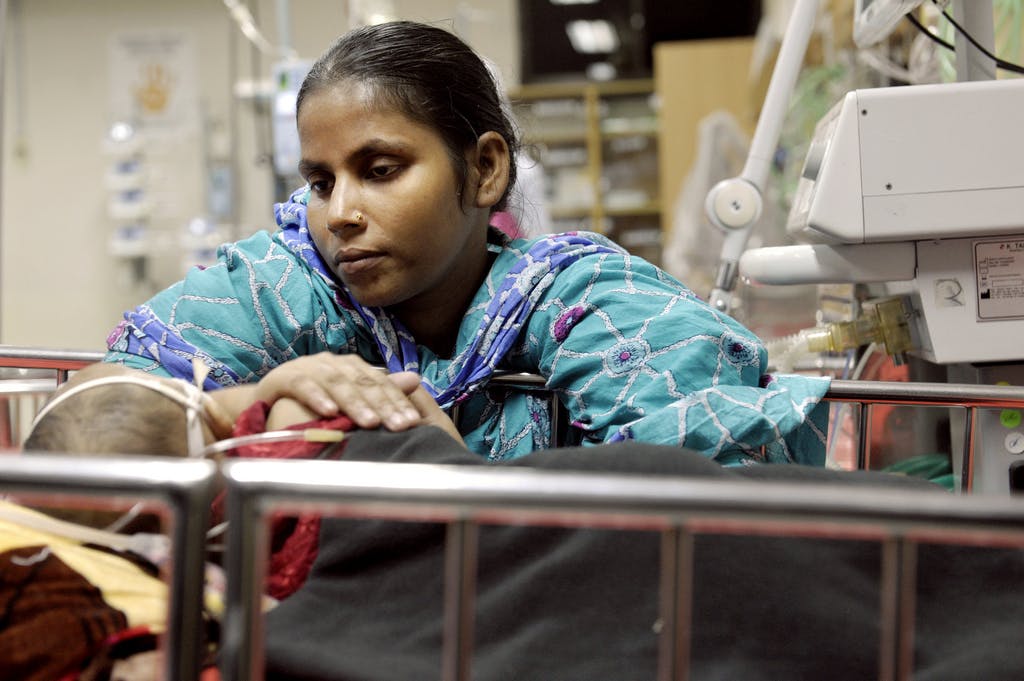
-
Safeguarding Global Health
Strengthening global health is fundamental to our development agenda. Better health is central to human happiness and well-being. Good health also contributes to economic progress, as healthy populations live longer, are more productive, and typically save more. This year’s General Assembly will address two major global health issues: tuberculosis and non-communicable diseases (NCDs), which includes heart disease and cancer.
Why It Matters: Seven in 10 people worldwide die from cardiovascular diseases, cancer, diabetes, and chronic lung diseases – NCDs. At the same time, emerging threats like antimicrobial resistance are growing. Unless the world takes bold action, the UN estimates that the number of people who die from antibiotic-resistant infections could reach 10 million a year by 2050. This includes tuberculosis, which kills more young people and adults than any other infectious disease and is the world’s biggest killer of women.

-
Fueling Innovation and Smarter Data
We are in a new era of technology for social good. The UN is already harnessing the power of emerging technologies like drones to better serve those in need, but the entire international community needs to capture more useful and timelier data — especially on the needs of marginalized and vulnerable people and those furthest behind. The UN Secretary-General will convene the first High-level Panel on Digital Cooperation to guard against the unintended consequences of technology and increase international cooperation. Additionally, the Global Partnership for Sustainable Development Data and other partners will launch new efforts to use data to fight hunger and address other challenges.
Why It Matters: We need innovation to bend the curve toward our global goals. We also need better data and enhanced transparency so civil society, the private sector, and the public sector can identify and understand barriers to progress and build on best practices. Better data also means policymakers can make more informed decisions and we can more accurately track our SDG progress.
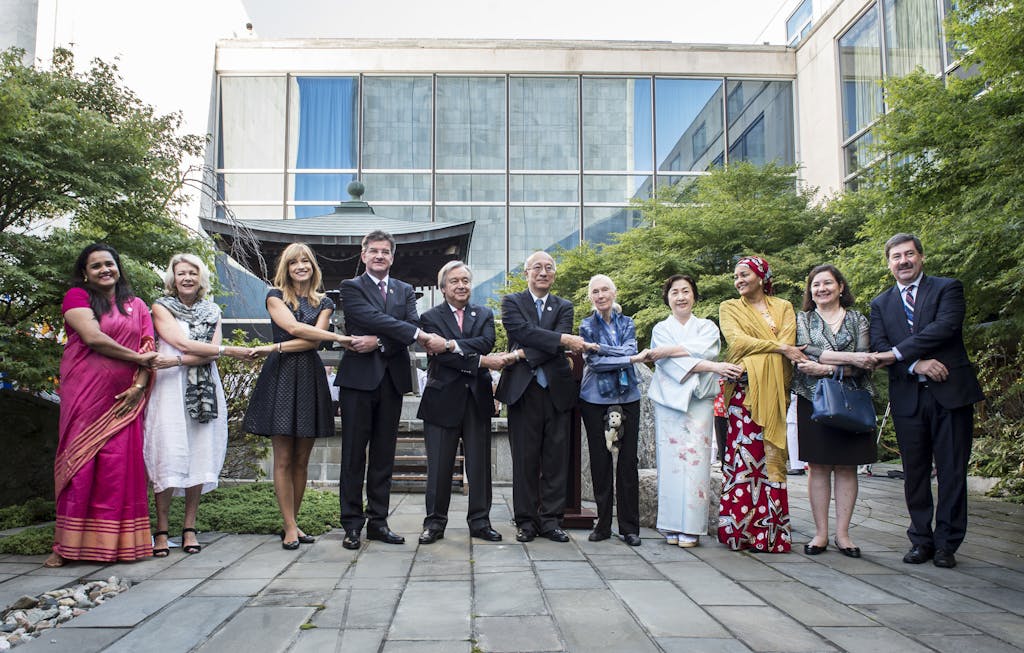
Japan’s Permanent Representative to the UN Koro Bessho and UN Messenger of Peace Jane Goodall. (©UN/Kim Haughton)
-
Forging Partnerships
To achieve our collective goals, we must find new solutions, new ideas, and broader collaboration among all sectors. This means mobilizing more private capital, exploring new innovative financing mechanisms, and forging stronger partnerships that are tailored toward countries’ particular needs and plans for sustainable development. During UNGA, the Secretary-General will launch his strategy for financing the 2030 Agenda, and private sector leader and others will participate in important conversations on how we can unlock financing for the SDGs and measure business action through initiatives like the World Benchmarking Alliance.
Why It Matters: We need local action, the resources and expertise of all sectors, and a broad range of partnerships to achieve our global agenda. UNGA brings a range of leaders together to forge connections, share what works and explore collaborative approaches to common problems.
Follow the UN Foundation on Twitter, Facebook, and Instagram for live updates from the UN General Assembly.

